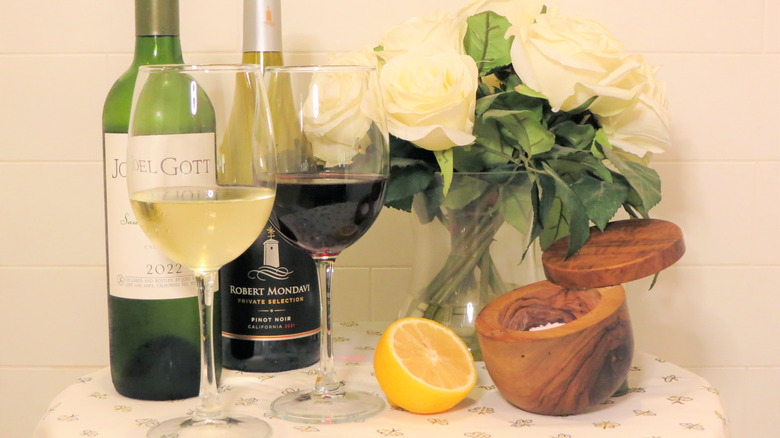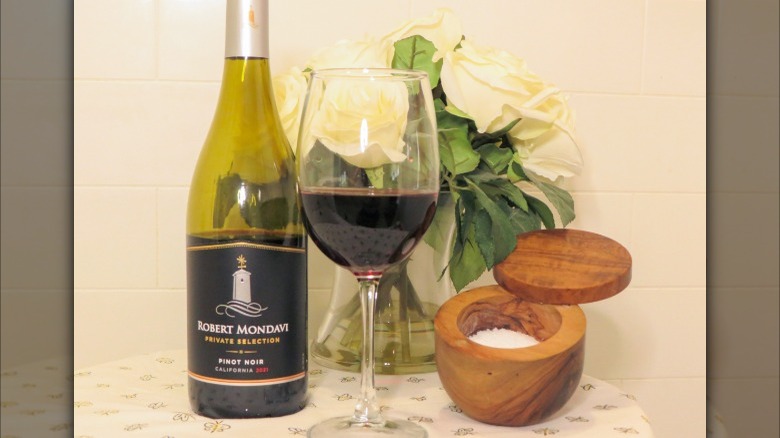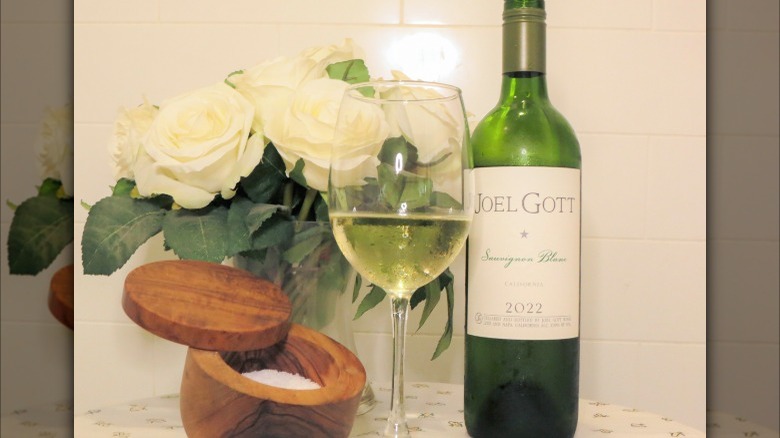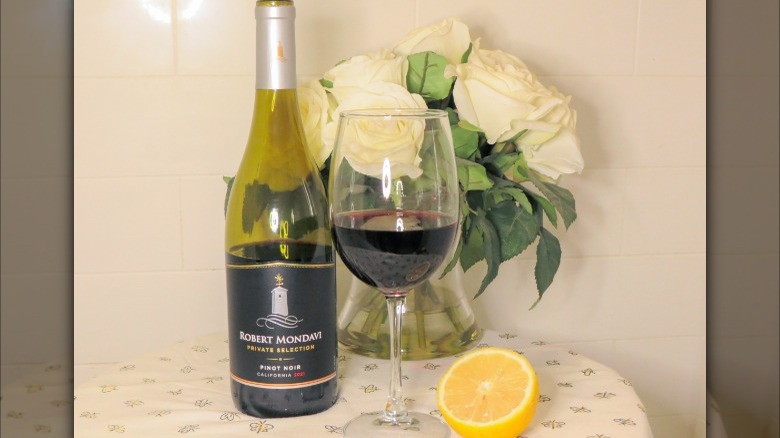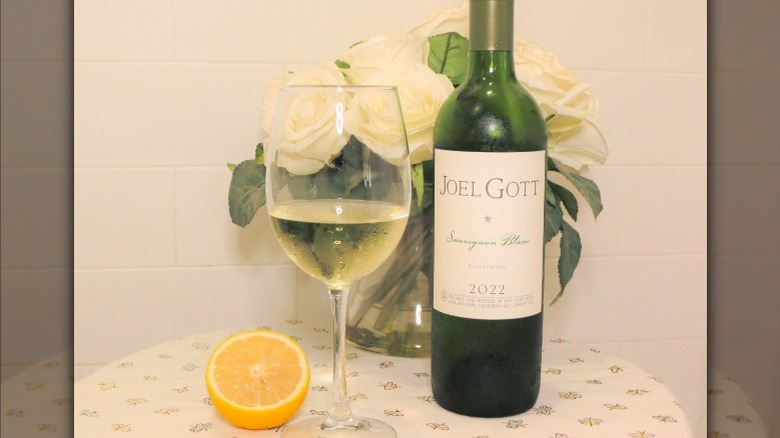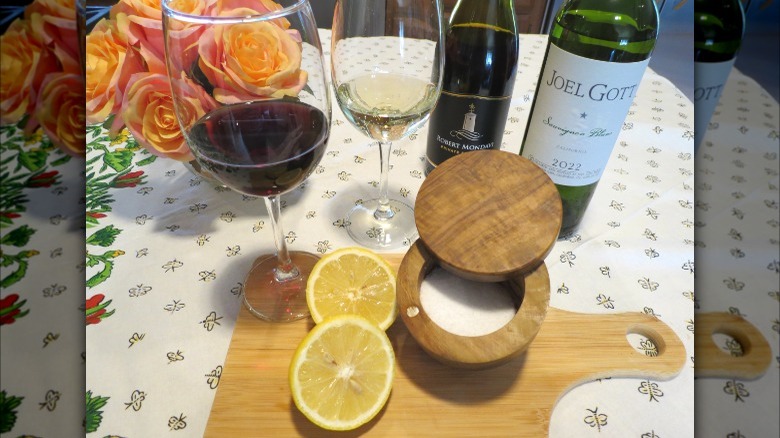Wine With Salt And Lemon Is Actually Good (We Tried It And So Should You)
Almost 20 years ago I walked into a charming winery and tasting room in Temecula Valley's wine country for my first day as an administrative assistant. All I knew about wine was that I liked drinking it, thanks to a semester abroad in Tuscany in college. A few months in, I was transitioning from answering phones to working as the assistant manager of the wine club and participating in a crash course in wine tasting (during work hours!). At first, I couldn't tell the difference between a wine having notes of blackberry and one with essences of currants, but when I began detecting notes of banana on the nose of a chardonnay and leather in that of a sangiovese, I knew I was in the realm of something really exciting and special.
As much as I would have welcomed spending my days at work tasting wine and refining my palate, I spent most of my time writing newsletters and ensuring the wine club was running smoothly. Natalie Maclean, however, has seemingly built her empire on tasting and reviewing wines, and schooling folks about the ins and outs of food and wine pairing. I recently came across a guide about tasting wines alongside lemon juice and salt. The concept was simple: choose a red and white wine, taste them alone, and then taste them after shocking your tongue with pure salt and then lemon juice. Do the elements make a difference in the taste of the wines? The experiment was so simple and so unusual that I had to find out for myself.
Pinot noir with salt was surprisingly sweet
When it comes to wine tasting, I'd always been told to taste the whites first, followed by the reds, and finally ending with sweet wines. But Maclean explained that it's best to start with the driest wines (typically the reds) and end with the sweetest because tasting sweet and white wines first can make red wines taste bitter. So, I followed her lead and started with a red wine I purchase regularly: a 2021 Robert Mondavi private selection pinot noir which is under $15 a pop.
Taking my cues from Maclean's video, I took a sip of the wine to get the base flavor which included lots of raspberry and cherry; it's super juicy with some mellow tannins that just barely coat the tongue. In wines, tannins give wines bitterness and sharpness, which isn't always necessarily a bad thing. A wine with lots of tannins will make your mouth feel dry. I then wet my finger and lightly dipped it in some kosher salt and let the crystals dissolve away before taking another sip of wine. I immediately noticed that the wine's tart juiciness was gone and the tannins all but disappeared.
In her video, Maclean had a slightly different experience. While she found the wine to be smoother after tasting the salt (I did as well), she felt it was juicier, while I didn't. She also noted that the fruit flavors really jumped out post-salt, which I also agree with. I thought the dark red berry flavors overwhelmed my whole mouth (in a good way) and I could even sense more sweetness in the wine. Overall, I thought it tasted lovely.
Sauvignon blanc with salt was zesty
I then jumped over to the white wine I'd selected which was a 2022 Joel Gott sauvignon blanc, priced at about $14. This is a bright, fruity, and very refreshing wine that I find is perfect for warm weather. I love the pucker it brings with its acidity and citrus-forward character. It even tastes a little salty and mineral-y at the back of the throat. It smells of fresh peach, guava, and a sunny beach vacation.
After taking the initial sip followed by a fingertip of salt (by the way, eating pure salt is, in a word, blech), and then another sip of wine, I found that I could have gulped it down like water. The salt neutralized the acidity in a big way, making the sauvignon blanc as smooth as butter. Maclean found that her white wine tasted drier after the salt but I felt differently. My mouth filled with green apple, lime zest, and passionfruit flavors that were much more apparent after tasting the salt. In my experience, the salt made both wines taste very good. Alongside something salty like a blue cheese soufflé, cacio e pepe pasta, or a white pizza, both of these wines would be fantastic pairings.
The lemon and pinot noir pairing was surprisingly fruity
Generally, lemony dishes aren't associated with red wines so I didn't have high hopes that lemon juice would do anything positive for my pinot noir. According to Maclean, the tasting steps with lemon are the same as they were with salt; you take a sip of wine, have some lemon juice, followed by another sip of wine. Before I began round two I gave my palate about a five minute rest and sipped on some water. After taking the first sip of pinot, I ran my finger pretty firmly around the freshly cut side of a lemon and placed that on my tongue before taking another sip of wine.
The result was really unexpected; I found that the lemon juice made the wine feel much more tannic, like there was a coating on my tongue. I was surprised because Maclean found that the lemon juice took the tannins in her red wine away completely. At the same time, the flavors of fruit noticeably came to the surface for me with it becoming easier than ever to identify the red fruit notes. Overall, I thought the lemon juice brought out the wine beautifully.
Sauvignon blanc with lemon was tropical
If I initially thought any of these four pairings would work well together, it was the one I ended with, or lemon juice with sauvignon blanc. After all, any time I make something with a lot of lemon flavor (lemon spaghetti, shrimp and grits with lemon sauce, chicken piccata), I almost always reach for a bottle of this white wine and I'm never disappointed. With the notes of citrus already in the wine, it's a given, in my opinion, that it pairs well with lemon. My assumption was right; the lemon juice did good things for the wine.
The lemon made the sauvignon blanc taste noticeably sweeter. Not sugary-sweet, but the acid from the lemon just made the wine's acid mellow so that the wine as a whole felt silky smooth and, instead of a sharp tang on the initial sip, I tasted soft tropical fruit notes. Any pucker factor that the wine normally produced was gone and what was left was a wine pairing I could do for days.
Final thoughts: give this a try!
Overall, there wasn't one pairing of salt and lemon juice with red and white wines that I didn't enjoy. Each combination gave me excellent flavors and a pleasant mouthfeel, something I'd have never imagined since salt and lemon are such aggressive flavors on their own.
I suppose it takes wine experts like Maclean to show us that wine can be fun and is certainly nothing to be afraid of. It's worth exploring different pairings (even ones that sound wacky) and getting out of your comfort zone because you never know what will pleasantly surprise you until you try it.

